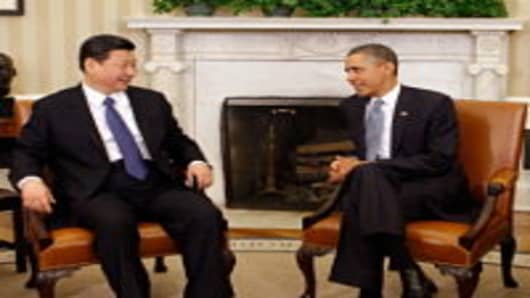President Barack Obama told Chinese leader-in-waiting Xi Jinping on Tuesday that Beijing must play fair in international trade and vowed to keep pressing China to clean up its human rights record.
In White House talks, Obama sought to reassure Xi that Washington welcomed China's "peaceful rise" but also signaled that frictions will remain in a growing economic and military rivalry between the two countries, despite Beijing's political transition.
Xi's meeting with Obama was the centerpiece of a heavily scripted visit that could help the Chinese vice president boost his international standing and show he is capable of steering his country's crucial relationship with Washington for the next decade.
Obama's firm message, echoed by Xi's official host, Vice President Joe Biden, on trade, human rights and global issues such as Syria was notable, given that the meetings were previewed as essentially sizing-up sessions.
Obama has taken a tougher line with China in recent months, and is under election-year pressure from Republican candidates, who say his policy has been too conciliatory.
"With expanding power and prosperity also comes increased responsibilities," Obama said as he sat side by side with Xi in the Oval Office.
"We want to work with China to make sure that everybody is working by the same rules of the road when it comes to the world economic system, and that includes ensuring that there is a balanced trade flow," he said.
Washington has long urged Beijing to do more to help reduce the U.S. trade deficit with China, which soared to a record $295.5 billion in 2011, underscoring concerns in Congress about Chinese currency and trade practices that put U.S. firms at a disadvantage.
But U.S. leverage over Beijing is limited, not least because China is America's largest foreign creditor.
Xi, 58, in line to assume the presidency in March 2013, said he looked forward to building a "cooperative partnership based on mutual respect and mutual interests" but did not address Obama's veiled criticism of Beijing's policies.
Each leader smiled and nodded as the other spoke and they shook hands during an appearance before reporters.
At a State Department lunch, Xi later said the two sides should strive for a greater balance in trade and investment but must resolve disputes through dialogue, "not protectionism."
Strains Persist
Seeking to assuage Chinese sensitivity to protocol, Xi was treated to a prestigious Oval Office encounter and was also received with military honors, including a 19-gun salute, at the Pentagon. Xi's titles include vice chairman of Beijing's Central Military Commission. But since he is not yet head of state, he was not given the full red-carpet treatment.
Xi's visit comes at a time when ties between Beijing and Washington — the world's two biggest economies — have been buffeted by strains over economic disputes, human rights and each country's military intentions in the Asia-Pacific region.
"On critical issues like human rights we will continue to emphasize what we believe is the importance of recognizing the aspirations and rights of all people," Obama said.
Chinese leaders traditionally bristle at U.S. criticism of their rights record as meddling in their internal affairs.
Outside the White House gates, several hundred anti-Beijing protesters chanted slogans against China's crackdown in Tibet — an issue that Obama's aides said would figure in talks with Xi.
Vice President Joe Biden, in remarks at the State Department lunch, chided China over another sharp policy difference — its decision to join Russia last week in a veto of a U.N. Security Council resolution against Syrian President Bashar al-Assad.
Chinese media had mostly followed the government's lead in the build-up to Xi's visit by playing down bilateral tensions. But it was still early morning in Beijing when Xi held talks in Washington, so it was unclear how fully the U.S. criticism about trade, human rights and Syria would be aired there.
Chinese officials have carefully choreographed Xi's U.S. trip as a rite of passage in a once-in-a-decade leadership change. He is expected to become head of the ruling Communist Party later this year as a prelude to the presidency.
U.S. officials hope the talks will help them gauge the priorities Xi will pursue. He is less stiff in public than the man he will succeed as president, Hu Jintao, but his views remain largely opaque to policymakers in Washington.
Xi is the highest-ranking Chinese official to visit since Obama launched a new U.S. "pivot" toward Asia in November to counterbalance China's increasing assertiveness in the region. Beijing has expressed misgivings about the U.S. shift.
Like Obama, Xi will not want to come across as a pushover in the face of U.S. pressure. He has to play to a powerful Communist Party apparatus and nationalist sentiment at home.
Xi's tour will take him from Washington to a farm in Iowa to Los Angeles as he looks to ease Americans' worries about China's strength and intentions. He is a Communist Party "princeling" — the son of a revolutionary leader — but also fond of small-town America and Hollywood war dramas.
Obama's aides see the visit yielding few, if any, formal agreements, but they expect the leaders to size each other up.
Biden told his Chinese counterpart "the American people are looking forward to getting to know you."
Xi may have his work cut out for him, according to a new ABC News/Washington Post poll, 52 percent of Americans had an unfavorable impression of China, while 37 percent saw the rising Asian power favorably.


